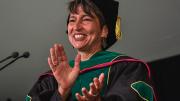“Giving care is an ultimate act of love and hope, and hope is an act of communion,” said associate professor Dr. Joia Mukherjee, M.P.H. ’01 at the Harvard Medical School (HMS) and Harvard School of Dental Medicine (HSDM) Class Day ceremony today. Mukherjee, a renowned leader in global health delivery and the chief medical officer of Partners in Health (PIH), gave the keynote address, in which she highlighted the importance of “radical hope” and even delivered a moving vocal performance of “Wade in the Water.”
She encouraged graduates to “wade into the waters of suffering,” using medicine to address the “pathogenic effects of social inequality,” such as poverty and racism. Instead of focusing only on biomedical pathology, she urged the new doctors to consider the larger contexts of patient suffering, and to use their skills and empathy as physicians to fix social ills. “Your eyes will become tired from seeing the seemingly unchanging earth” and its suffering, she said, but “radical hope and action can be your superpower.”
In her own work with PIH, an international public health organization, Mukherjee has seen the healing effects of hope first-hand as she developed healthcare programs in Haiti, Peru, Mexico, Russia, Kazakhstan, Rwanda, Lesotho, Malawi, Sierra Leone, Liberia, and the Navajo Nation. She recounted the story of a child with treatment-resistant tuberculosis in a rural part of Peru, at a time when the nation’s ministry of health wouldn’t allow children to be treated with promising new drugs. Through a community effort, including everyone from PIH staffers to medical researchers to a local bus driver who drove the girl to doctor’s appointments, the team was able to change the ministry’s policy and cure a child who may have otherwise died.
Borrowing a symbol from the child’s favorite book, The Little Prince, Mukherjee said that “Hope seemed as far away as Asteroid B612,” when the team began treatment, but that the experience in Peru stands as a testament to the fact that, “Hope and action in solidarity with others will help you cure a sick child, change a local system, and even move the levers of power.”
Radical hope goes all the way back to the Bible, with Moses parting the Red Sea, she said. But it “was not a clean cut,” where the water neatly parted on either side with a “welcome mat.” The water was troubled, swelling up violently on either side, but for Moses and his people—armed with the hope of arriving at a new shore—it was navigable. She challenged these new physicians to stir up a bit of good trouble, and then she launched into an a cappella rendition of “Wade in the Water,” to enthusiastic applause.
“The COVID-19 pandemic is a pandemic of pandemics,” she said. It has worsened poverty, “exposed the violence of racism, and demonstrated the epic failure of the market alone to deliver outcomes that are equitable.” These new physicians are entering a challenging world, but she urged them to maintain the “belief that our collective action can, and even must, bring about change.”
And her final word of advice? “Wade in the water.” The crowd erupted in a standing ovation.
“Live the Questions Now”
Other festivities during the event included student speeches by HDSM student Kumar Guntaka, D.M.D. ’22, and HMS student Okechi Boms, M.D.’21, M.P.P ’22, and Samuel Lyon, M.D. ’22.
Guntaka recounted his childhood spent in rural India and as an immigrant to the United States, where his parents worked 80 hour weeks “scrubbing bathroom floors” to keep the family afloat. Referencing the disruption of the pandemic, he urged his classmates to embrace that the “only constant in life [is] unpredictable change,” and joked that the bonds they have formed with one another “are much stronger than any [dental] sealants we’ve ever placed.”
Boms quoted Rainer Maria Rilke, saying that, as young doctors, he and his classmates are bound to feel unsure of themselves, but that they must “live the questions now,” and perhaps gradually they will “live along some distant day into the answer.”
Lyon, a proud father of three and one of the oldest members of the HMS Class of 2022, began by thanking his classmates for the opportunity to speak. “The weeks of nausea I’ve gone through in anticipation of this speech have allowed me to lose weight and transform this ‘dad bod’ into a ‘grab bod,” he joked. Before attending HMS, Lyon served as a company commander in the U.S. Army where he witnessed a comrade get his legs blown off in an explosion. He asked his classmates to close their eyes and imagine themselves as part of the care team for this wounded soldier. “I challenge you to bring your whole self, to fully engage, to heal the patient but to also invest yourself in the person. That is where the real work is accomplished.”
The ceremony concluded with the new physicians receiving their diplomas. As their names were read aloud, they were addressed as “doctor” for the very first time.









